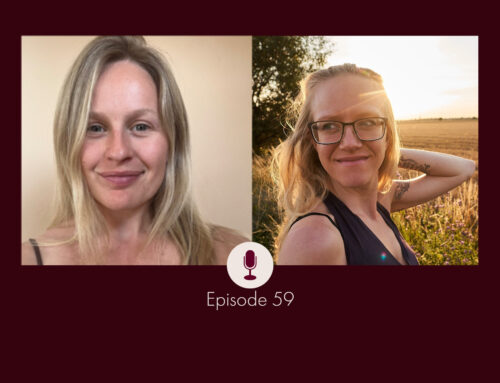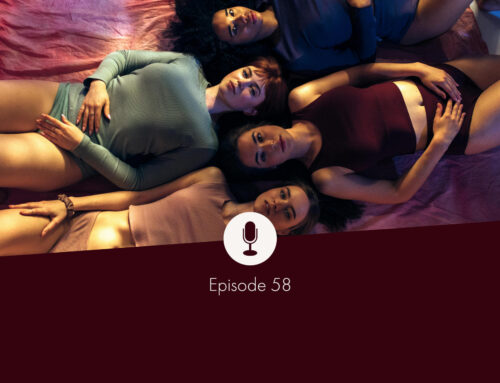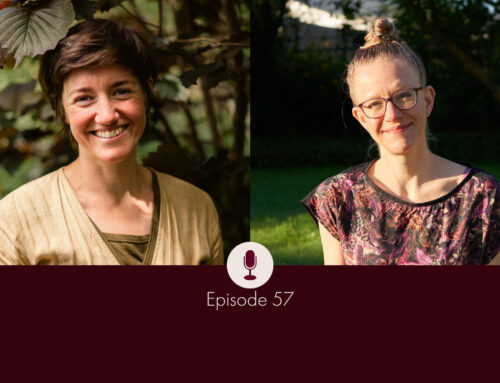[00:00:45] Lisa Jara: Hi, and welcome everyone to today’s episode of “A Fireside Chat about Taboo Topics” series, which is a series of conversations I have with people around topics that I find aren’t nearly enough talked about in our society. And today’s topic is going to be endometriosis, and I have with me Amy Connor from the UK. Hi Amy.
[00:01:11] Amy Connor: Hello.
[00:01:13] Lisa Jara: And yeah, I’m really looking forward to dive into both your personal story and how you support women with endometriosis today, and your work, but first of all, please introduce yourself, who you are, your work in the world, and a cycle check in, which I do on these conversations, which means simply stating the day of your cycle that you’re on in case you track, and one, two, or three words for how you are today.
[00:01:45] Amy Connor: Okay, so firstly, thank you so much, Lisa, for inviting me on to talk about this really, really important topic. Hello everybody, I am Amy Connor. I am based in a little seaside town called Hornsea here in the UK and I’m a dog mom of two and I’m married to Tom and I am really passionate about supporting women with their health and especially endometriosis. With it being my personal experience, I am really, really passionate about talking about all these taboo subjects and topics and just breaking down barriers so we can live our fullest lives.
[00:02:32] And in terms of a cycle check in, this is a really interesting question for me because I don’t actually track my cycle in terms of the day that I’m on, and there’s a number of different reasons why that is. One is that anything to do with numbers and time and the concept of time moving forward can be a little bit uncomfortable for me. So I tend to avoid that as much as possible, as much as it’s manageable in the world that we live in.
[00:03:03] And also cause as you’ll hear as we go, I’ve never really fully connected to my cycle and after my surgical hysterectomy, it really dawned on me how important my natural cycle is, and was in terms of my menstrual cycle. And it’s only really recently that I’ve been grieving that and really allowing myself time to acknowledge what I’ve lost in respect of that.
[00:03:35] And I had a really difficult journey into menopause and, you know, losing my womb, and I really struggled with that. And coming out the other side and having done all the work that I’ve done to overcome that and to be the person that I am today, I don’t feel called to label myself as menopausal or to give myself any label at all, other than what I am in the moment.
[00:04:12] And I check in with myself every day. And sometimes, you’ll know this, you need to check in more than once to make sure that you are on track with where you need to be. So that’s what I do and I just honour as much as I can whatever my body needs me to do that day and at that time. And today, I am feeling really, really full of gratitude and just really excited to have this connection with you and to talk about this much needed discussion.
[00:04:51] Lisa Jara: Mm, thank you. And thank you also for sharing all of what you’ve shared because yes, indeed, time is cyclical. Time doesn’t just work in the linear fashion we’ve been led to believe by the calendar, which is also just a manufactured calculation of how time works. But as you, you Amy, and you as the listener or watcher, may have experienced, we sometimes feel like we’ve come full circle. We are seemingly at the same place again that we were two years ago, but time has passed and time has done a full circle for you, so you’re not exactly in the same place. Because you’ve learned and grown and experienced so much during that journey. It’s just that you’ve kind of completed one spiral and now you can move on to the next. So I love that you just take it as an invitation to listen to what’s present today and how you can bring that into what’s on your plate that day.
[00:05:58] Because I think that’s for me what the cycle check-in is about, to just see where you’re at and how you can take care of yourself, given all the circumstances that you cannot change. And for me, today I’m on day 28, I can feel my bleed lurking around the corner already. I do feel a little bit angry, like this premenstrual rage is definitely there, which allows me to speak up for what I believe in. I’m also really grateful, as are you, for this conversation today. And I’m also a little bit tired. I’m looking forward to closing this cycle month for me.
[00:06:48] Amy Connor: Bless you.
[00:06:52] Lisa Jara: Yeah, so the topic of endometriosis isn’t much talked about in society still, although research and everything has gotten more, but many women out there receive their diagnosis of endometriosis very, very late, and I believe that a lot of hysterectomies could be avoided if women were to touch base with their cycle and their body much earlier than that. And as you are an expert, or definitely a go-to person for this topic, Amy, would you maybe briefly explain what endometriosis is, for everyone who doesn’t know that yet?
[00:07:36] Amy Connor: Of course. Yeah, so endometriosis is a condition where tissue similar but not identical to the endometrial lining of the womb that we shed every bleed, grows outside of the womb. So there’s a misconception that this can only happen in the pelvis area, and that’s not true. It can grow anywhere in your body. Obviously the most common areas are around the outside of the womb, fallopian tubes, ovaries, bowel, bladder.
[00:08:16] But it can also go further up, so it can be on nerve endings, it can be in your lungs, in your eyes, in your brain. It can literally get anywhere, it’s a very horrible condition. And then obviously every month when we have our cycle, this toxin cannot shed, it cannot get out of the body, so it tends to pile up and pile up and create a sticky glue that can fuse organs together and it can have a massive, massive impact on women’s lives.
[00:08:55] And one of the things I really want to talk about is, because recently here in the UK we’ve had a couple of TV shows put the light on endometriosis, because we had Endometriosis Awareness Month recently. And when you talk about feeling angry, I was like, I can get really angry really quickly when I talk about this topic.
[00:09:19] What was shared on both of the programs that I watched was that it was a, you know, endometriosis was a heavy period. That is complete BS. It is not a heavy period. Many women who have endometriosis can experience heavy bleeding, but not every woman does. And for me in particular, that definitely wasn’t one of my top symptoms. But there’s this misconception that endometriosis is heavy, painful periods and it is much wider than that. So that’s the first distinction that I really want to make sure that people understand.
[00:10:04] And as you’ve shared, it’s really hard to get diagnosis for this, because at present, the only way they can get a diagnosis is through doing a laparoscopic procedure, to go into the abdomen to see if the endometrial tissue is there.
[00:10:25] And obviously that involves surgery and trauma to the body, but there are many, many symptoms that women can be experiencing for years, and in some cases decades, before they even get a referral. You know, it’s dealt by gynaecologists in the medical field and before they even get to that gynaecological referral, they’re experiencing so, so many symptoms, but they’re not actually getting an answer.
[00:11:00] So, for a lot of women, the symptoms can, I mean, it varies for each individual, so I’m always conscious, I don’t want to speak generically, that every individual has this, but things like constipation and digestive issues, intense pain and swelling. And this can be all month around, not just when you bleed, it can be all the time.
[00:11:30] Ovulation can be really painful, some women can get cysts on their ovaries and the big thing I see a lot and was definitely my experience is women don’t feel heard because they’re going to their doctors, they’re going to their medical professions with all these things going on in their body, and they’re not getting any answers. Or they’re being told “It’s your period pain, take some pain relief or have this birth control pill.” And it’s such a massive psychological aspect to this condition as well, because women are not being heard and they’re not being understood. And here in the UK the average time for diagnosis is seven to nine years, which is just shocking.
[00:12:27] And even though recently we’ve had a lot of talk about it, here in the UK we’ve had MPs [Members of Parliament] discussing it, it’s just still not getting enough recognition for women, you know… so you’ve got this physical aspect of all these horrible physical conditions that these women are experiencing. And then there’s the psychological aspect of them feeling that it may all be in their head.
[00:12:55] And I know lots of women, including myself, I’ve been told by medical professions that maybe it is all in my head and you know, it’s just my period that every other woman is coping with fine. And that impact, psychologically, on our relationships with ourselves, with our partners, with our family, with our friends is a huge side of lots of health conditions, not just endometriosis, that are massively overlooked and play a significant part in addressing and finding solutions to supporting women with this condition.
[00:13:42] Lisa Jara: Yeah, and I believe that this is part of the condition, this not being heard and seen is also part of what leads to it happening in the first place. I know that we both have studied with Dagmar Khan on the pelvic health and she has discovered that women with endometriosis have certain characteristics in common in their mindset. And with mindset, I don’t mean just in their head, but like in their whole system. Which is this utter rejection of the feminine, because in the society we live in, we are trained that everything feminine is weak. Feminine in terms of yin energy, I don’t want to say like men/women. But it’s weak, it’s not good to receive, it’s better to act. We have to be on all the time and not resting and all of that.
[00:14:38] And so, in order for women to be able to have the careers they wanted or maybe they thought they wanted, they had to compete with men and become almost like men and shut their system down. And another part, again, they weren’t heard for who they are, they had to perform as somebody else to make it.
[00:15:03] And also this part of not wanting children because children take away your freedom and your freedom of choice, and it’s a nuisance to have children and to care for them, which is another characteristic. And again, it’s like we feel not heard, like we are afraid that when we have children, our needs must get last because again, the society tells us that mothers please always put everyone else before their own needs.
[00:15:35] Amy Connor: Definitely. Yeah.
[00:15:37] Lisa Jara: And so no wonder there is this rage and I’ve heard a spiritual teacher of mine say that because there is inflammation associated with endometriosis – I mean, there is no science, no research around which comes first – but she says that this rage at the conditions that we are not heard and we can’t express ourselves, we internalise it, which leads to rage, inflammation, kind of like anger. To me it makes sense that it worsens the condition.
[00:16:13] Amy Connor: Definitely. And so everything that you’ve just touched on there, that can be available on a conscious level and also the subconscious level, you know, because when I first heard one of the metaphysical causes was fear of motherhood, I was really offended by that. I was like, you know, I’d do anything to have a normal womb and to be able to have a child and have the option of having a child. And it wasn’t until I really unpicked everything that was going on, it’s such a complex issue.
[00:16:46] This, the physical I talked about in the introduction there, the really basic level physical stuff that’s going on with endometriosis and what it actually is doing to us psychologically and our body is storing that inside. To get to that, we need to know how to talk to the body and how to talk to ourselves in a way that’s really loving, non-judgmental, because as you said, from society, we have all this judgment and all these labels and expectations put on us. And sometimes consciously we can be aware that they’re there, and sometimes it’s a real subconscious part of us.
[00:17:38] So as I said, for me, I was really triggered when I first heard Dagmar talking about that and I was like, “Oh, I don’t believe you. That’s not me.” But once you start to really unpick what’s going on and just stop looking at the medical aspect of it and look at the whole-body approach, then we start to get really interesting and deep into who we are. And that’s when we start to heal. That’s when we start to unlock those healing codes within us.
[00:18:14] And, you know, endometriosis is your body telling you something is wrong. And when I first started my journey, I wasn’t listening to that. I was trying to tune it out. I was taking the medications, I was totally resenting my body, not looking after myself fully, not honouring what my body was trying to tell me. And sadly, it was after I had my hysterectomy, which didn’t heal me, that I started to really listen to what my body was telling me. And when I started to listen, that’s when things started to fall into place for me.
[00:19:06] Lisa Jara: I would love to know a little bit more about that. You say you had the hysterectomy and then you still – was it that you experienced symptoms or how did you know that there was still something going on?
[00:19:19] Amy Connor: Okay, yeah. So to give you a little bit of background, I started my menstrual cycles when I was nine and they were painful from the beginning and I always assumed that this was normal that feeling unwell around my period.
[00:19:38] And because I started so young, I was one of the first in my peer group to start, I was in a really small school, they didn’t have sanitary bins in the toilet, so all of that had to come in for me. And there was a lot of shame around my period and a lot of panic that I was going to bleed through my school uniform. I can remember sitting in lessons dreading standing up, especially in summer when we had the summer dresses on. Just thinking, “I really hope, I really hope I’ve not …”, you know. I was just constantly paranoid that I was going to bleed through my clothing and this went on.
[00:20:21] And then when I got to secondary school and got to the age where I was a bit more independent and I was going out with friends and I realised that my friends were able to do things on their periods that I just didn’t have the energy for, didn’t feel good about, and it just really affected my mental health. I got really tired and I started to explore whether there might be something a bit more to it. And my medical record was just like you could wheel it in, because there was just so much of these files, and I’d go for all different doctors, different specialists.
[00:21:16] So a big part of my experience was chronic constipation and digestive issues, and I got treated a lot for the bowel issue and the digestive issue rather than the gynaecological. I’m talking very medical here because I didn’t step out of the medical world until much later and I had lots and lots of medical procedures that were very intrusive, painful uncomfortable and never got any answers. I was a big control freak, I liked everything to be in control, I liked to be able to do things to support myself, and I wasn’t getting any answers, and it was just so frustrating. It was so tiring.
[00:22:14] I’d stepped into a career and I was one of these women whose medical appointments were getting in the way of work and getting back to work after procedures. So I think I had about six surgeries in total relating to my reproductive systems, so gynaecological surgeries. And every time I’d go in, I’d have the procedure, I’d get told next to nothing about my condition and end up back to square one, in more pain, in more discomfort, having more treatment.
[00:23:02] And eventually, I was probably about 25, 26 at this time, and it had got really, really bad and it was affecting every single part of my life. And I could literally just sum up enough energy to go to work, and then I would come home and I would just be absolutely exhausted. I’d be in extreme amounts of pain. I can remember going for a job interview with heat patches, you know, stick on heat patches, you can get. I think I had about 12 of them. Up my back, because I used to get really bad sciatic pain down my legs with it. I’d swell up so my clothes wouldn’t fit. And it was just horrendous. I just felt rubbish.
[00:23:55] My husband, well he wasn’t my husband at the time, my partner, we’d be declining invitations to social events because I just couldn’t cope with going. I had a niece, my niece at the time was two, and from birth to her being two I really struggled with holding her and getting down on the floor to play with her because I was in that much pain. And I was really, really low and I was suicidal, you know. I really thought a lot about what is my quality of life here? You know, how is my husband going to have a decent life with me dragging along behind him?
[00:24:44] So from a place of absolute desperation, I had a hysterectomy. And you know, when I look back now and see how that unfolded … I remember going in for the surgery and as the surgeon came around to do the check-ups, I remember just saying to her “What’s happening with my cervix?” And she looked up from the clipboard and said “Oh, well, you’re not going to be needing it, so we’ll just whip it out whilst we’re in there.”
[00:25:16] And you know, knowing what I know now, grieving the loss of my organs the way I have, I just think, “Oh my God, how could I let that happen? Like, what was I thinking?” But I was just in this place of desperation.
[00:25:36] So I had the surgery, the surgery went wrong, so I had to go in and have further surgery. My recovery time was a lot longer and I literally left the hospital with a carrier bag full of pills and all sorts of concoctions, and I got told that I had to wait six weeks then to start taking my HRT and I didn’t have to stop taking my HRT till I was 52.
[00:26:06] Lisa Jara: And just for everyone who doesn’t know, Hormone Replacement Therapy, to help your body have the hormones, it can’t produce itself.
[00:26:15] Amy Connor: In essence, to replace the hormones that my ovaries would’ve been producing. So I had a total hysterectomy. There’s different terminology all over the place for different people, but that was my ovaries, my uterus and my cervix. And I got discharged given this carry bag, “six weeks and then start your HRT” and that was it. I didn’t have any follow up appointments. I didn’t have any support around dealing with this life changing decision. There was no support leading up to having the decision.
[00:27:00] And one thing that I really reflect on a lot actually is, there was one point – so I suffered really badly with ovarian cysts as well. And there was one point where I had a cyst that was 25 centimetres, on my left ovary. And as you can imagine, it was taking up a lot of room, causing a lot of distress and pain and discomfort. When I went on my hen weekend, my best friend was seven months pregnant, and I looked more pregnant than she did.
[00:27:31] And that’s another thing that I had to overcome as well. I’d get a lot of people mistaking me for being pregnant because of how swollen I was. And so there was all that going on. And then I’d gone to have this procedure, to have this cyst checked out and they thought it was cancerous, so they took me down a cancer pathway.
[00:27:58] So I got seen quicker and during that time, after every scan procedure that I had done, a nurse would come and take me into another room, ask me if I was okay, ask me if I had any questions, give me lots of leaflets and really support me. And then as soon as it was realised that it wasn’t cancer, that support stopped.
[00:28:26] And then I’m going in to have this surgery. My husband and I don’t have any children, and it was a really difficult decision to make. And for me, I’ve had this fear that if I did become pregnant, that I wouldn’t be able to cope physically with the pregnancy and that I would be a really, really rubbish mom because I couldn’t even bend down to pick up my niece.
[00:29:01] So I had all these emotions going around my head. So much happening. Physically in a really bad place, mentally in an even worse place. Went to have this life changing surgery and there was absolutely no support at all. And you know, when I look back on it now, it just blows my mind. That happened and it makes me really proud of the fact that I got through it because I understand how big a deal that was. And there are so many women out there that have gone through this and still aren’t getting any support and that absolutely breaks my heart.
[00:29:54] So I had this surgery, my physical symptoms improved dramatically. I wasn’t in constant pain, I still struggled with my bowels and my digestion, but in terms of the physical pain, it had reduced significantly. I wouldn’t say it had gone, but it was like a massive, massive improvement. So then I got into this mindset of, “Oh, I’m better. Everything’s better now” and to the outside world, because it’s such a messy subject and people don’t want to talk about it, they see me looking better.
[00:30:34] I lost three stone in weight. I got healthier. I could move around more and get fit and, you know, play with my niece and nephew and so to everybody else “Amy’s well and everything’s okay”. But internally, a lot was happening for me and my body was changing in ways that I didn’t understand and I was having all these different symptoms and I’d get really, really bad brain fog and memory loss, to the point where I felt I was getting dementia and Alzheimer’s.
[00:31:13] You know, I can remember my husband coming into the kitchen one morning and I just couldn’t remember his name. And I’d do really silly things like drive to the wrong, you know, drive to the house that I lived at three years ago instead of going to the home that I live in now. Like all these silly little things that were happening and it kept building and building.
[00:31:32] Lisa Jara: And I just want to say, you were going through menopause.
[00:31:36] Amy Connor: Yeah.
[00:31:37] Lisa Jara: Your body was moving through menopause and these are symptoms associated with menopause usually, but you probably didn’t realise that at the time.
[00:31:46] Amy Connor: Definitely. That’s exactly it. And it wasn’t until I went to a health and healing fair and I was exhibiting with my business and there was a woman next to me and she had this really simple display and it was all about menopause. And I can remember reading this one picture, a visual that she had on at her display and just thinking, “Oh my God, that’s me. This is me.” And it was just like, “How did I not know that this was happening?”
[00:32:24] I was taking my HRT and I had physical symptoms as well, so my vagina was so dry and so sore and really painful to the point where some days I couldn’t wear underwear because it was just too painful. So that was embarrassing. I didn’t want to talk to anybody about that. You know, I had breast pain, I had joint pain, there was so much and I was like, “This is menopause. Like, this is it.” It took me a while to really start to listen to my intuition. And my intuition has played such a huge part in what I call my healing journey.
[00:33:14] So I listened to this lady and all she had to say about the menopause and I was like, “Right, so this is the menopause.” And I went to my doctor, talked about HRT a couple of times, and I just knew from my body she wasn’t liking the HRT. To the point I used to get a patch that I’d stick on my skin and then every couple of days I’d have to change it, and it made my skin so sore that I had to find a different patch to put it on every time I switched, because my skin was still really inflamed and soft.
[00:33:48] And I can remember one morning getting out the shower, drying myself off and getting my patch, looking down at my stomach and my legs and they were just covered in these sore patches. And I can remember just thinking, this is my body telling me it doesn’t want this. And I just made the decision then that I didn’t want to be on HRT till I was 52. And I went and told my husband, and he was like, “I totally support what you’re saying, but I don’t know anything about this and I want to make sure you’re safe”. Because, you know, we’ve been told the horror stories that all my bones were going to crumble and all this stuff is going to happen. And he is like, “You know, I’ll honestly support anything you want to do. I just want you to make sure that you’re doing it in a safe way. ”
[00:34:43] And a couple of days into it, I can remember looking at my dog, and we were sat on the sofa, it was me and my husband and our dog, and I said to my husband, “She’s had a hysterectomy, she doesn’t have all these pills, you know?” And I was like, “I know you think I’m crazy, but I can just feel it, that I don’t need these tablets.” And it was literally, for me, it felt like taking the HRT away was like giving my intuition and my inner wisdom this permission to come forward. The irony being that they talk about menopause being your wisdom years and it was just literally like, “Come on, you’ve lost so much to this, let’s not lose anymore.”
[00:35:46] And prior to this, I had left my job. So I had a really stressful job. I worked in safeguarding for children and education, so I heard and witnessed a lot of sad things and horrific things. And I’ve gone to that job one day and I was really tired, really angry. It’s the end of the week and I was thinking “I just can’t wait to get home”. And there was a massive caseload, too much to do, and I went into this team meeting and our manager shared with us that one of our team members had lost his wife the night before. Completely unexpected.
[00:36:36] And I sat in that meeting and I just thought, “I need to get out of here. I’ve gone through this big journey of endometriosis. I’ve lost my womb. I’m feeling physically better. Do I really want to give the best of me to this job that is literally sucking my soul out of me?” And you know, there’s, I think it was Robin Williams who’s quoted to say, you’re killing yourself for a job that will replace you within 48 hours, or whatever the saying is. And I just thought, I’m not doing this anymore. And I went and handed my notice in at the end of the meeting. “You know,” I said, “I don’t know what I’m going to do, but I know that I’m not destined to do this.”
[00:37:25] And then this step out of the HRT, listening to my body, giving her the foods and the supplements that I know that she needed, allowing her to rest and really connecting with her because I had had years or decades of resenting her. You know, literally telling her that I hate her, being completely disgusted with my own vagina. Just thinking it was always causing me pain. If it wasn’t bleeding, I’d have a UTI (Urinary Tract Infection) or it’d be itching or you know, there’d be some kind of discomfort. I just had this really negative narrative around my own body and I can remember thinking “This isn’t right. How am I meant to become better and grow and thrive when I can’t love myself and I’m treating myself with all this resentment, swallowing the pills and pushing down what naturally needs to happen?”
[00:38:40] So when I talk about endometriosis and the hysterectomy not healing me, that’s what I mean. I felt I was doing it as the ultimate cure. The big thing was, Lisa, that I’ve learned the whole of my journey, is I was giving my agency to other people. I was expecting my doctor to get me better, my surgeon to get me better, so I could just jump off the bed and get on with life.
[00:39:26] And it’s when you realise that actually you have a say over what happens to your body, you have complete agency, you can treat her with love and respect, and you can demand that others do the same. And you have a choice over what you put in your body. On your body. You know, like that was the big switch for me.
[00:39:50] Lisa Jara: Yeah. And I believe that’s the worst condition or the worst thing a human can experience, this powerlessness. And we live in societies and structures that teach us the expert on us is outside. The doctors must know better because they’ve studied it. They haven’t studied your own unique body, by the way.
[00:40:13] So it’s not even your fault, you know, you have been raised in this society too, where we constantly look to the outside for wisdom, for validation, for everything. So no wonder you refer to the outside world. And some people unfortunately have to go through such an experience to understand that the power has been with them all along.
[00:40:39] Amy Connor: Massively. And you know, I talk now about how my womb space is my business partner. And I spent so long resenting my womb, you know. And even after my hysterectomy, I just completely shut it off and was just like “Let’s not think about it”. Didn’t grieve it and now when I connect with her, when I connect with that space, and I feel that sacred anger of exactly what you’ve just talked about, being completely uninformed, misinformed, looking outside instead of looking in and being able to use my voice to speak up and to let other women know that there is another way and it’s far more fulfilling.
[00:41:34] And when people come to me and they’re talking about their endometriosis, I try to get them to understand that when we work together, we’re going to go much, much broader than that. Things are going to change for you that you didn’t think were possible and you’re going to start to get gifts in places you didn’t think they would be.
[00:42:01] I started this call saying, I’m really grateful today, you know, to be here, to be with you. And old Amy didn’t have any gratitude in her. And it makes me feel really sad to think about that, but I was just so stuck in my victimhood of my body and how awful it was and what was happening to me, that I completely forgot to look outside. Not only to look within, but also to look outside to all the wonderful gifts that we have. You know, nature is a really great healer. And I said, I’d come home, I’d be exhausted, I’d just be flaked out on the sofa or in bed if I wasn’t at work. And just that complete disconnection, not only from myself, but from being part of nature, being part of this beautiful planet that we share as our home. There was so much disconnection.
[00:43:08] Lisa Jara: And that’s why the main body of my work is about cycle-based living. That is your personal cycle, but you are nature, basically, and nature works in cycles. So your body works in cycles too, and has all these beautiful gifts to offer.
[00:43:32] Amy Connor: Yeah. A hundred percent. A hundred percent.
[00:43:35] Lisa Jara: When we dare to listen, because in our society, I don’t want to generalise either, but from my own experience, I know and from many women and people who bleed, I have talked to, our body felt like a thing that we can’t control, but we need to press it into a certain shape and form because that’s what’s expected of society. Then it gives us all this pain. Then it doesn’t work the way we want it to work. And we have been trained that our bodies are wild animals that need to be tamed and pressed into a certain form, because that’s what colonisation and patriarchy teach, mind over body. But when we let this wild animal lose, we suddenly feel, “Oh, we are alive now.”, when we let that animal lead.
[00:44:37] Amy Connor: Yeah, definitely. And you know, there’s so many things you can do to help yourself. And just going back to the first question you asked me about what is endometriosis, I gave a really medical answer and to go back to that, it’s not a gynaecological issue. You are not going to get to the bottom of your endometriosis by focusing on your womb, your ovaries, it’s not going to happen. It’s an oestrogen dominant condition, and there are many things that you can do to support yourself in overcoming that and getting your endometriosis into remission.
[00:45:24] And one of the things that makes me so angry is this narrative that we have in the medical community, which is really loud, that everybody sees and hears, that endometriosis is incurable. And that is so toxic. And I fell victim to that and I get so passionate and so angry about this because it’s not incurable. You just need to know how to address the body.
[00:45:57] Your body is an ecosystem. There are so many systems in your body that are working every second of the day to make sure that you are doing the best that you can do. And if you are, like I was, really struggling with your health physically and emotionally, your body is still doing this amazing job of keeping you alive.
[00:46:25] And that’s something that I never really connected with and never really got to understand, because back then I didn’t understand that every system in your body works together, so it’s never going to get injured on its own or get healed alone. Everything is working beautifully to make sure that you can thrive.
[00:46:54] And when we look at the medical model of endometriosis, that’s telling us that we’re incurable, it’s only looking at a very, very small part of the body. It’s not even getting into your environment. You cannot get well in the environment you became ill within; I say this all the time. You’ve got to be able to want to change your environment, to enable your body to change and enable yourself to thrive. And it’s really scary, it’s really daunting and it’s hard work. I get that. I’ve been there, I’ve experienced it. But when you get out the other side, the rewards are just endless.
[00:47:50] There isn’t, you know, there’s nothing more beautiful than being in touch with your body, understanding how your body works. Because this is another thing that I say to my clients as well, and they experience this, what we go through together, I’m giving them the tools that they need to really unlock all the different healing modalities they’ve got within them. It’s all in them, they just need to know how to access it.
[00:48:23] Lisa Jara: And I even want to say, if I may, that our body’s natural – how to say – function, response, is to go towards a healing state. And we need to create, as you said, the condition so that our bodies can move to that state on their own.
[00:48:45] Amy Connor: Yeah, definitely. And when I’m working with clients, when we’re on this journey together, the experiences that they have, they’re then able to spread to their families. And it’s so wonderful to watch somebody step into the power of their own body and understand. Cause we are told all the time by the media to fear this, fear that, protect yourself from this. And to know that what you’ve got inside you is enough, and once you know how to connect with and to share that connection and that knowledge with those that you love and those around you, you’ve become this beacon of just health and thriving and authenticity.
[00:49:43] I have a big thing about authenticity. We live in a world where everything is so fake and we’re just bombarded with stuff that we just do not need to consume. And it’s overpowering. It makes us feel worthless and unworthy. We’ve got to look a certain way to be attractive and to be healthy. And really, when I stepped into my intuition, when I stepped into my healing, a big part of it was stripping all that out. Turning the news off, really controlling what I consume on social media and knowing when it’s time to step away. And it makes me really sad when I see people so trapped in that world. Bothered about getting those connections online and getting those likes and getting those shares and, you know, getting those followers when the focus needs to be on connecting here inside with you, because that’s where the value is and the magic is.
[00:50:59] Lisa Jara: Yeah. And I love that you said that it’s hard work. It’s not for the faint of heart to go on this journey within and get to know yourselves. And you don’t have to do it alone. There are people like you and I out there. There are even more who can stand by your side while you make your way through.
[00:51:22] That’s why I love the cycle work too, is because with all the different phases you’ve got in your personal cycle, in the centre, it’s you, it’s your truth, it’s your essence. Or, like you said, your authenticity that you get to know with every cycle. You get to know yourself a little bit more intimately, more deeply, and you let your own truth shine out. And, I mean, that quote is used so often, but when you let your light shine out, others will find the courage to let their light shine as well, right?
[00:52:02] Amy Connor: Yeah. And it’s everything, isn’t it? You know from the work that you do, it is so important. Like you just said, to come into it knowing that healing isn’t linear. You’re not going to start off unwell and follow the journey and get well, sometimes you’ve got to go to darker places, to get well and to get better. And that’s not talked about enough because we’re just seeking this false idea of what wellness is and what health is and what happiness is.
[00:52:53] Lisa Jara: And healing is cyclical too. And spiralling, like we said in the beginning.
[00:53:00] So Amy, if someone who watches this is now so intrigued and really wants to go on their journey to heal from endometriosis or feel more fulfilled in their life and not as if they are powerless in the face of their condition and they would like to get in touch with you, where can they find you? How do you like to connect?
[00:53:27] Amy Connor: Yeah, so thank you for that. You can connect with me through my website, which is www.vaginatruthbomb.com, and in there you can sign up to be part of my community. So something I’m working on at the moment is to try and get my community off social media and into a platform where we can just focus on exactly what we need to be focusing on and not have all the distractions. So anybody who goes to my website, you’ll be able to find it quite easily. There’s a community specifically for individuals who have endometriosis, and within that I do lots of free resources and mini bite size sessions that you can come along to and just really get to see what my vibe is, what it’s like to work with me, get to know me.
[00:54:26] And I’m always open for connection. I think it’s so important. It’s a huge part of healing to be able to connect with other people. So that’s what I’m working on at the moment, is moving my community onto a private platform, so that’s where you can find me.
[00:54:49] Lisa Jara: Cool. Do you have anything that would like to be shared now? As some closing words, your message to everybody out there?
[00:55:02] Amy Connor: So my message to anybody listening to this who has endometriosis or suspects that they have endometriosis, because I appreciate that getting a diagnosis can be a difficult journey, is that you are not alone and you are definitely not incurable.
[00:55:26] Your body is capable of so much. So much. I am literally just not even fully through the door as to how much my body can do for me. And the promise that I made myself when I set up Vagina Truth Bomb was to be the person that I needed back when I had to make that decision to have that hysterectomy.
[00:55:58] And I would have liked to have somebody who has experienced it and understands what I’m going through and who has a deeper knowledge and understanding of what’s going on. And that doesn’t mean that you have to come into my world and agree completely with everything that I’m saying. I completely understand.
[00:56:18] People find me at different parts of their journeys, but if you are struggling, if you’re not been listened to, if you’ve not been heard, then the vagina truth bomb is definitely a community where you will be held, heard, loved, and be able to ask any questions that you have on your mind.
[00:56:43] Lisa Jara: Thank you, Amy, for doing that work because I believe that all that we need for healing is to be and feel seen and heard and appreciated for who we are deep down.
[00:57:02] Amy Connor: Thank you.
[00:57:04] Lisa Jara: Thank you for being here with me today. I will definitely link to your website and everything in the show notes or in the description. And yeah, speak to you next time. Bye.
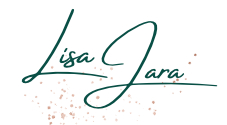


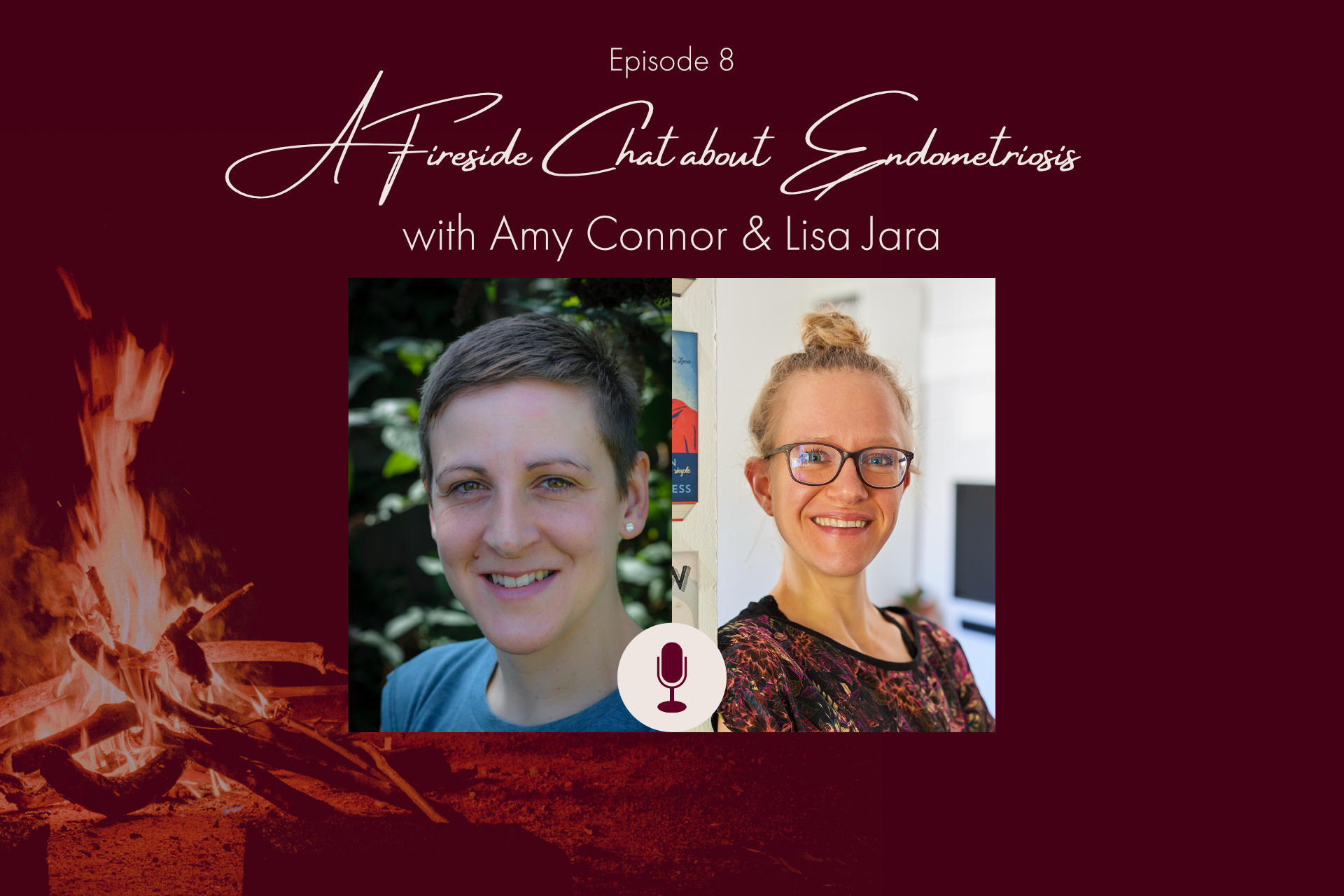
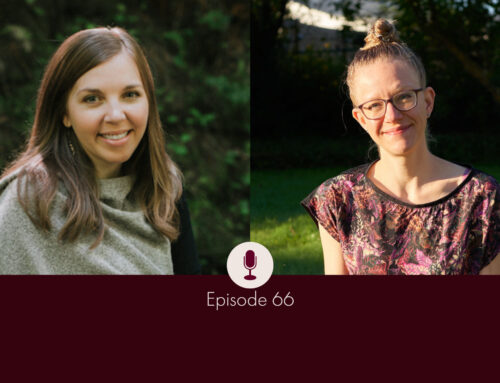
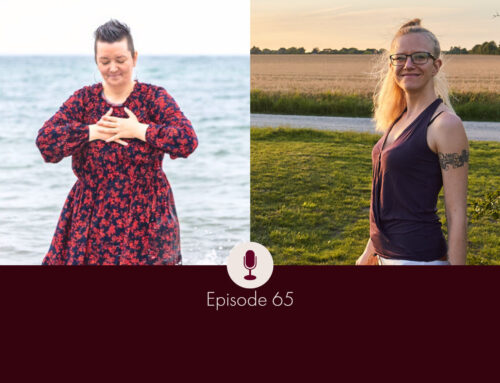
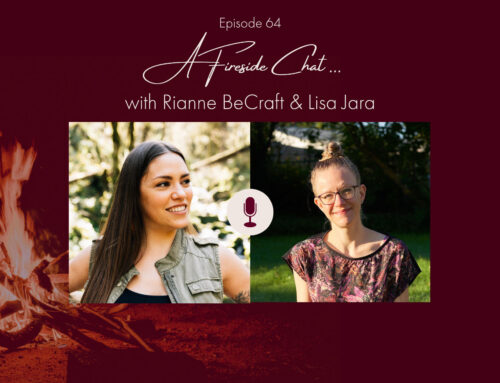
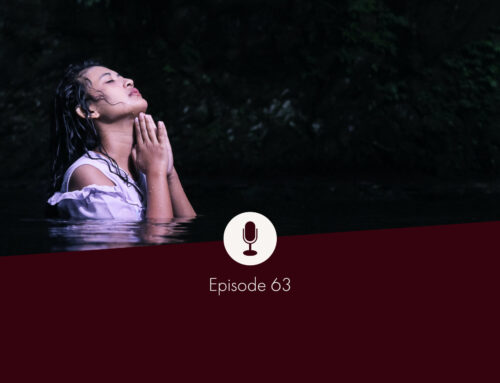
![Soothing the Inner Child to reduce Emotional Eating [Live Coaching]](https://lisa-jara.com/wp-content/uploads/2024/07/Womb-Whispers_Episode-60-Live-Coaching-Soothing-the-Inner-Child-to-reduce-Emotional-Eating_Beitrag-500x383.jpg)
